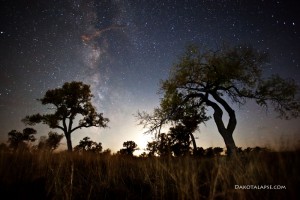Some of my favorites from shooting timelapse in 2012. These were all frames from a timelapse. The timelapse will be out this winter.
Click on Photos to Enlarge
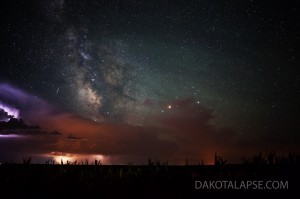
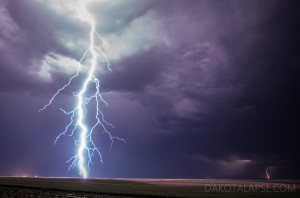
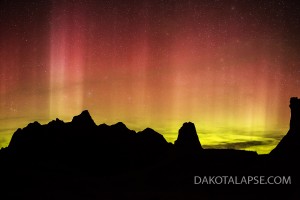
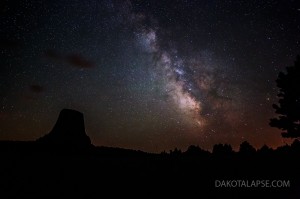
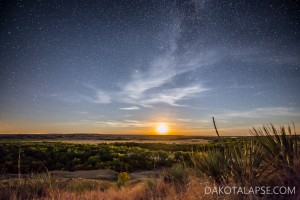
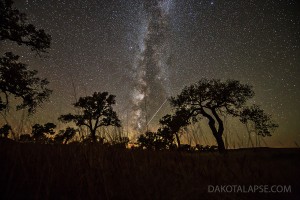
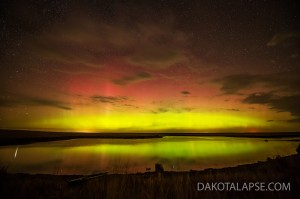
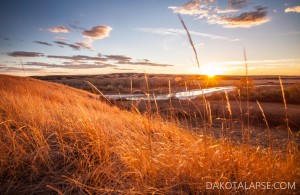
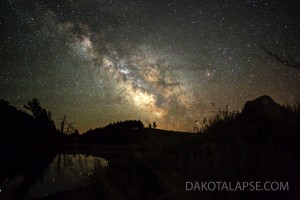
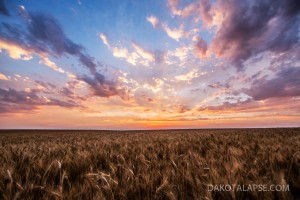
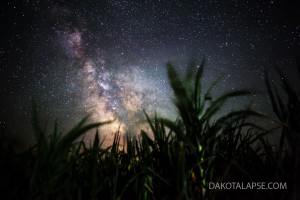
Some of my favorites from shooting timelapse in 2012. These were all frames from a timelapse. The timelapse will be out this winter.
Click on Photos to Enlarge











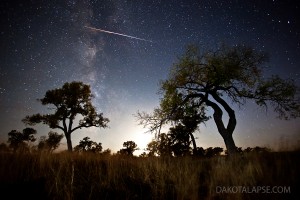
_______________________________________________________________________________________
What you see is real, but you can’t see it this way with the naked eye. It is the result of 20-30 second exposures edited together over many hours to produce the timelapse. This allows you to see the Milky Way, Aurora and other phenomena, in ways you wouldn’t normally see them.
In the opening “Dakotalapse” title shot, you see bands of red and green moving across the sky. After asking several astronomers, they are possible noctilucent clouds, airglow or faint Aurora. You can also see the red and green bands in other shots. This video has Milky Way, Aurora, Meteor and Moon lit night timelapse. This was shot entirely at night. If it looks like daytime, it is actually the moon lighting up the landscape.
This was shot with Canon DSLR’s as stills, and consists of over 33,000 stills shot in RAW format, at the highest resolution possible, on each camera.
Featuring two original scores by Simon Wilkinson http://www.thebluemask.com and also some from his Royalty Free Collections. This does not have Bear McCreary’s music on it, his music is on this video.
Order Prints and Gallery Wraps
_____________________________________________________________________________________
[add_to_cart item=”1010″ quantity=”user:1″ ]
[add_to_cart item=”1009″ quantity=”user:1″ ]
____________________________________________________________________________________
South Dakota residents must pay 4% sales tax.
All downloads are for home or personal use only. May not be incorporated into a production, altered or uploaded to other web sites. For those uses contact.
____________________________________________________________________________________
Milky Way Segment 8+ minutes
Aurora Segment – 2+ minutes
Desert (Colorado/Utah) – 2+ minutes
Moon Light – 6 minutes
Deer Lapse – 1.5 minutes
Fall Skies – 2+ minutes
Behind the Scenes (timelapse of timelapses)- 1 minute
You will see the same scenes as the online Temporal Distortion video. But this was a completely different edit, with the shots seen at full length, and you will see a bunch of new ones.
_____________________________________________________________________________________
The Aurora were shot in central South Dakota in September 2011 and near Madison, Wisconsin on October 25, 2011.
Most of the video was shot near the White River in central South Dakota in September and October 2011, but there are other shots from Arches National Park in Utah, and Canyon of the Ancients area of Colorado during June 2011.
Canon 5D Mark II and Canon 60D
Canon 16-35, Tokina 11-16
Shot in RAW format. Manual mode, Exposure was 30 seconds on most Milky Way shots, 15-30 seconds on Aurora. ISO 1600 – 6400 F2.8.
Thanks to Dynamic Perception for their support, and for making the Stage Zero Dolly, which I used on most of the shots.
I used a Kessler Crane pocket dolly and KC Lite Crane on a few shots as well.
Photography and Editing – Randy Halverson
Music – Simon Wilkinson
Additional Photography – River Halverson
Production Assistants – River Halverson and Kelly McIlhone
Opening title by Gus Winkelman // Winkelmedia LLC // Contact Guswinkelman@gmail.com for creative solutions
Available in 4K Ultra HD for licensing.
Contact for licensing footage, or anything else.
Randy Halverson
dakotalapse@gmail.com
Follow:
Google + https://plus.google.com/115274420552571826637/posts
Facebook http://www.facebook.com/dakotalapse
Twitter http://www.twitter.com/dakotalapse
Still frames of some additional shots on the extended cut.
[nggallery id=6]
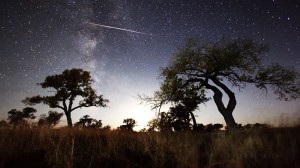
[add_to_cart item=”1011″ quantity=”user:1″ ]
[add_to_cart item=”1012″ quantity=”user:1″ ]
Featuring an original score by Bear McCreary (Battlestar Galactica, The Walking Dead, Eureka, etc) Bear wrote about composing Temporal Distortion here. Thanks to Bear for taking the time to do this!
Download an MP3 of Bear McCreary’s Temporal Distortion on Amazon or on Itunes
________________________________________________________________
The extended cut is 23+ minutes of Milky Way, Aurora and other night timelapse, it has two original scores by Simon Wilkinson, as well as some from his Royalty Free collection.
________________________________________________________________
What you see is real, but you can’t see it this way with the naked eye. It is the result of 20-30 second exposures edited together over many hours to produce the timelapse like taking . This allows you to see the Milky Way, Aurora and other Phenonmena in a way you wouldn’t normally see them.
In the opening “Dakotalapse” title shot, you see bands of red and green moving across the sky. After asking several Astronomers, they are possible noctilucent clouds, airglow or faint Aurora. I never got a definite answer to what it is. You can also see the red and green bands in other shots.
At :53 and 2:17 seconds into the video you see a Meteor with a Persistent Train. Which is ionizing gases, which lasted over a half hour in the cameras frame. Phil Plait wrote an article about the phenomena here.
There is a second Meteor with a much shorter persistent train at 2:51 in the video. This one wasn’t backlit by the moon like the first, and moves out of the frame quickly.
Watch for two Deer at 1:27 (look for a quick flash in lower left)
Most of the video was shot near the White River in central South Dakota in September and October 2011, but there are other shots from Arches National Park in Utah, and Canyon of the Ancients area of Colorado during June 2011. The Aurora were shot in central South Dakota in September 2011 and near Madison, Wisconsin on October 25, 2011.
Canon 5D Mark II and Canon 60D
Canon 16-35, Tokina 11-16
Shot in RAW format. Manual mode, Exposure was 30 seconds on most Milky Way shots, 15-30 seconds on Aurora. ISO 1600 – 6400 F2.8.
Thanks to Dynamic Perception for their support, and for making the Stage Zero Dolly, which I used on most of the shots.
Production Assistants – River Halverson and Kelly McIlhone
Opening title by Gus Winkelman // Winkelmedia LLC // Contact Guswinkelman@gmail for creative solutions
Contact for licensing footage, or anything else.
Randy Halverson
dakotalapse@gmail.com
Follow:
Google + https://plus.google.com/115274420552571826637/posts
Facebook http://www.facebook.com/dakotalapse
Twitter http://www.twitter.com/dakotalapse
Behind the scenes of Temporal Distortion from Randy Halverson on Vimeo.
[nggallery id=5]
On 10-16-2011 I caught the International Space Station, rising next to the Milky Way, on 3 cameras that were shooting timelapse. The moon rose shortly after it passed. The timelapse above is slowed down when the ISS passes.
Phil Plait also has an interesting article on it here.
This timelapse, and the others, are on the extended cut of Temporal Distortion.
The first camera was setup on a small lake with calm winds.
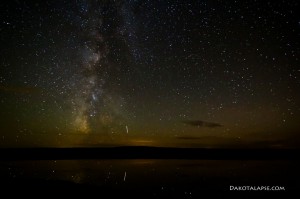
One mile south of there, I had 2 more cameras in the valley of the White River. They were both on Dynamic Perception dollies, doing low to the ground shots.
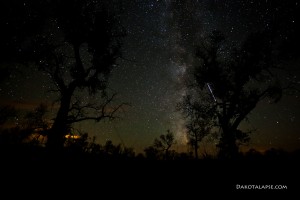
The 3rd Camera was about 100 yards south east from the second.
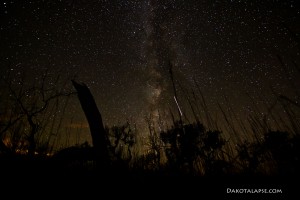
Bad Astronomer on the Meteor and persistent train
While shooting a Moon set with the Milky Way timelapse near the White River in South Dakota. I caught a meteor with a persistent train. It lasted for 68 frames of the timelapse then moved out of frame to the left. In real time it was over a half an hour. It takes a real bright meteor to show up this well in a frame. The timelapse looks real cool, that will be on my next video. Click the images to view full size. The first image was taken at 9:05 pm on October 1.
See a slowed down timelapse of this on Temporal Distortion
You can see the start of it on the left of the flash.

The Persistent train lasted over a half an hour, then moved to the left out of the frame. It is the orange cloud where the meteor was.
